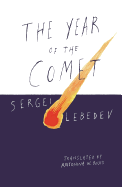
As Russia continues to redefine itself under Vladimir Putin, Sergei Lebedev's timely novel, The Year of the Comet, arrives like a brilliant meteoric streak to illuminate the intricacies of Russian national identity and the cataclysmic fall of the Soviet Union.
Lebedev (Oblivion) spins his story from the first-person perspective of a growing boy with a curious, intelligent mind, who is never named but rather identified through various family members and friends populating the narrative like elusive ghosts. Poetic and penetrating, and demonstrating an incredible talent for nuance and paradox, Lebedev offers a seemingly traditional Bildungsroman slyly built on the shifting fault lines of history and identity. That the boy's itinerant father studies catastrophes for a living, both manmade and natural disasters, reflects the immense and mysterious instability haunting these characters' lives, "as if the entire world was tormented by secret tensions." A guarded, paranoiac state of mind distinguishes daily life in Lebedev's Russia until the collapse of the Soviet Union in 1991.
Lebedev uses his coming-of-age protagonist to attempt nothing less than than the extrication of the individual ("the planet of another person's mind") from the orbit of dictators and from the bloody, nightmarish grip of history itself. By the end, Lebedev's inquisitive boy has upturned the false bottom of national consciousness.
The Year of the Comet is one of the best books of the year, and may be one of the best novels to come out of Russia in a generation. --Scott Neuffer, freelance journalist and fiction author

